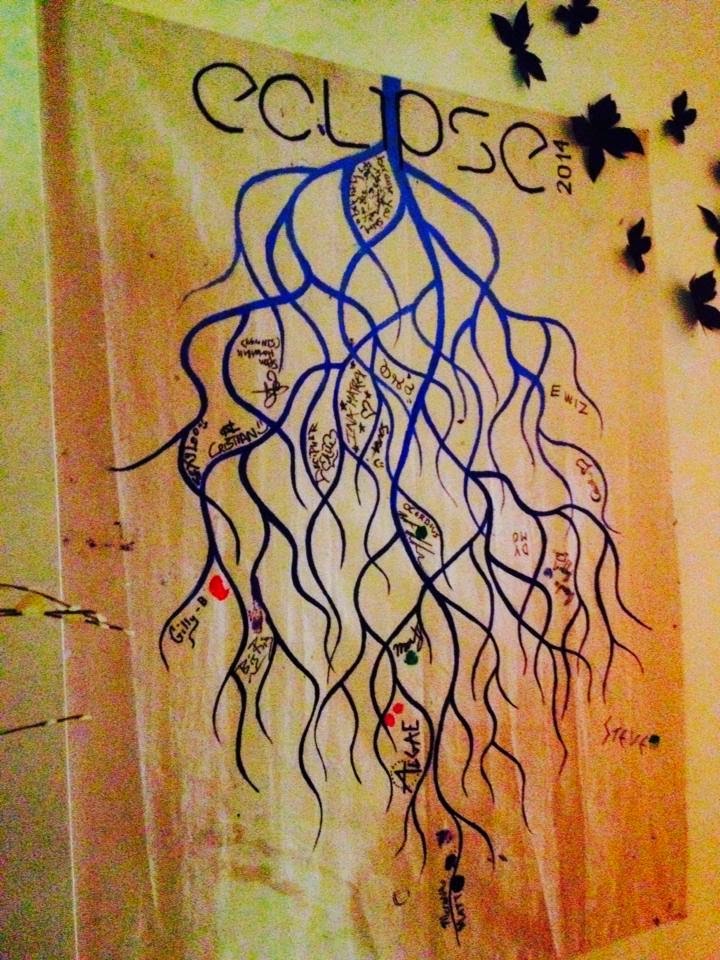 |
| A rhizome of memory. Thanks for the image, Syn. |
My girlfriend and I went to our first giant electronic music festival as part of our one year anniversary. Eclipse was quite possibly the largest, most entertaining, utterly epic shit-show that I’ve ever experienced, and I’d love to return to the next one in 2016. But I was also very philosophically stimulated by the entire affair, so while this post won’t discuss the personal aspects of the long weekend (because they’re personal), the political and metaphysical will get their due consideration.
When the hippie movement began, it was intensely political and deeply politically informed. They were the social revolution in the class of white intelligentsia in North America, a group of young people rejecting their parents’ ideals, at least for a while, large enough that they couldn’t be written off or swept under the rug. Yet the culture was always driven not only by socialist political ideals and opposition to international war, but also drugs. At first, psychedelics were pharmaceutical routes to personal and communal spiritual enlightenment. Now, the rhetoric survives, but psychedelics are now one part of a wider cornucopia of substances that exist mostly just to get you pleasantly fucked up.
I’ve noticed a recent trend in drug use that could actually put people’s health at considerable risk. MAOIs are chemicals that were originally developed as anti-depressants, but which are now pitched as a ‘high enhancer’ for people who are already having a really rather pleasant trip on LSD or mushrooms. But these drugs chemically contraindicate each other, resulting in extreme toxicity (which induces vomiting if you’re lucky) and can raise your blood pressure to disastrously high levels.
I’ve long had something of an ethical problem with using hallucinogens as party drugs, once again because of their original purpose in hippie culture as pathways, in conjunction with meditation and philosophical and scientific learning, to enlightenment. Under the guidance of a shaman, DMT, the active ingredient in ayahuasca, can bring a person into a trance that displays their entire past existence before them for contemplation and analysis in experience. The goal is to understand one’s entire past narrative as a foundation for ethical progress. That purpose of enlightenment has become largely forgotten as hippie culture has slowly changed its focus to dropping out of society’s rat races and getting pleasantly fucked up.
A reasonable skepticism of government chicanery about such deceptions as the Gulf of Tonkin incident and of hiding the full truth about the Kennedy assassination has developed today into a belief that the September 11 attacks were the work of government conspiracy (including anti-Semitic notions that Jewish businessmen were secretly in league with the CIA to destroy the WTC to foster conflict between the USA and Arab nations), and a healthy distrust of pharmaceutical companies has snowballed into widespread anti-vaxxerism.
The modern hippie community has no longer dropped out of the mainstream to inspire political revolution. They have dropped out merely for the sake of a misfit existence. Even the community’s political radicalism, where it exists, is misdirected. I overheard one attendee last weekend talking about his desire to move to a commune where everything would be shared. But he said that as soon as anyone attempted to barter or trade, he would leave. He called such behaviour, “economics.”
That seriously saddened me because it confused the mere act of asking for something in return for a product you worked hard to produce with the large-scale economic exploitations of the modern industrial era. A successful commune returns its residents to a lifestyle where power arises from the community’s own productive labour. It is not a place like a music festival, where the escapism and partying of the many attendees rest on the intense labour of a small technical crew working to the bone.
As I watched a field full of people dancing wildly on more speed than a fighter pilot usually takes while the enormous bass of hour-long psy-trance mixes blasts them with more powerful forces than a riot control sound cannon, it reminded me of Marinetti’s comments on the mechanization of man. Human industry creates a force so powerful that it dwarfs humanity itself, crushing it under its waves.
The psy-trance was exploding across the central field of Eclipse Festival for 90 of 96 total hours. Its rhythm constant, its beat continuous, its pulse shattering, its force unrelenting. As the music overtook our entire environment, dominating every aspect of our experience, I felt myself become psy-trance. In a wonderful, adventurous weekend that brought me romantic joy and happy encounters with old friends and new ones, I experienced philosophical disappointments that re-energized me for future creativity.
I realized that a book like Utopias, with its goal to help resurrect a livable ideal for a better world, is more necessary than ever when the former vanguards and prophets of that world have sunk into ignorance and self-absorption. Perhaps with a little charismatic writing, they can be woken up again.



















